BY: Joan Baxter
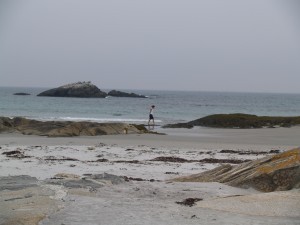 On a balmy, overcast August day, I stood at Port Joli Head in the Kejimkujik Seaside park on Canada’s Atlantic coast, nibbling on delectable little beach peas, staring out over the windswept beaches of white sand and rounded weathered grey stones, and at blue waves exploding white against magnificent rocks of granite as the ocean waters nudged relentlessly at the southern shore of Nova Scotia.
On a balmy, overcast August day, I stood at Port Joli Head in the Kejimkujik Seaside park on Canada’s Atlantic coast, nibbling on delectable little beach peas, staring out over the windswept beaches of white sand and rounded weathered grey stones, and at blue waves exploding white against magnificent rocks of granite as the ocean waters nudged relentlessly at the southern shore of Nova Scotia.
Just offshore, fat seals lounged on rocky islands, ensconced there like complacent and over-indulged Roman emperors. I envied them their thick layers of blubber that allowed them to slip happily in and out of the frigid crystalline waters, for their ability to live without a single thing but their own thick coats and their seal brains. And being in the national park, they didn’t need to worry about human predators as they lazed about on the rocks. They completely – almost insolently – ignored the human beings gaping at them through binoculars.
The park’s interpretive signs informed hikers that 18,000 years ago this area was covered by a sheet of ice three kilometres thick, and the land mass we now call Nova Scotia extended fifty kilometres out to sea. As the ice slowly retreated about 13,000 years ago, the sea level rose and the waters crept ashore, swallowing up land, even as the land itself was rising, heaving a sigh of relief as the weight of the ice diminished. That was naturally-induced climate change, caused by minute alterations in the earth’s tilt in its orbit that have brought about cycles of ice ages and periods of warming. Such change is gradual, happening over thousands of years. Life forms can adapt to the changes by evolving or finding new niches in which to live.
But that has not always been the case in our planet’s history. Between about 440 and 65 million years ago, there were five Great Extinctions, each of which wiped out the majority of the species on earth at the time. Scientists believe these were triggered by cataclysmic events — giant asteroid impacts and the eruption of flood basalts when molten rock bursts through the earth’s surface — that involved the release of enormous amounts of dust and sulphur dioxide into the Earth’s atmosphere. But it was the dramatic climate change the cataclysms invoked that caused the great extinctions.
Today, we’re in the middle of what is called the Sixth Great Extinction. The cataclysmic event causing it? We, the people. Human beings. Homo sapiens sapiens, literally “wise or knowing humans”. In this Anthropocene Era, human activity is shaping the world’s environment. We’re destroying natural habitats with our manic desire to consume. We’re causing mass extinctions and bringing about climate change so fast and furiously that we could bring about our own too, at least the collapse of civilization as we know it. So if our species is supposed to be the most intelligent, which one is the stupidest?
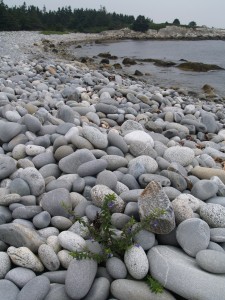 This is what I was trying not to think about that day as I wandered the trails of the Kejimkujik Park. I wanted to be one of those seals loafing about on a rock. I wanted to savour nothing but the tranquility, complexity and beauty of the natural sanctuary in which I knew I was extremely fortunate to be walking. It was such a respite from the crazy world I’d been travelling for decades, witnessing the wanton, almost defiant destruction of nature. Human hubris at work.
This is what I was trying not to think about that day as I wandered the trails of the Kejimkujik Park. I wanted to be one of those seals loafing about on a rock. I wanted to savour nothing but the tranquility, complexity and beauty of the natural sanctuary in which I knew I was extremely fortunate to be walking. It was such a respite from the crazy world I’d been travelling for decades, witnessing the wanton, almost defiant destruction of nature. Human hubris at work.
One heck of a global pickle
In Canada, that meant the gargantuan mess of the tar sands in Alberta, “developers” across the country devastating vast swaths of woodlands for shopping malls, pretentious and ostentatious suburban estates and resorts named after the trees, rivers and peoples that had been destroyed in the building of those malls, estates and resorts. Forests vanishing in the rush for “development”. And everywhere – from Africa to the Arctic – gashes in the earth big as craters a giant asteroid might have made, created by explosives or massive machines that chew up the earth to get at diamonds, bauxite, iron ore, titanium dioxide, gold, copper, any resource that goes into consumer goods being sold to an increasingly avaricious planetary public as essential to the good life.

Morila open-pit gold mine in Mali.
Computers, mobile phones and tablets, wall-hogging flat-screen televisions, cars, more and more household appliances taking up more and more space and energy, golf clubs, watches, cars, glittering gems, fashion must-haves, ever bigger and “better” homes (with more and more gadgets) and gardens (of mowed monoculture grass) – the stuff of modern living. This may all look great on the pages of glossy magazines and billboards, but the mines that produce the components in this stuff and the factories producing the chemicals and poisons that fuel consumerism sure don’t. Vast areas of the earth rendered toxic. Farmland and forests laid waste. We’ve got ourselves into one heck of a global pickle.
But in that small national park on the beautiful north Atlantic coastline, none of that could happen, at least not without a change in legislation. Everything in the park is protected, even from the human footprint; a wooden pathway keeps hikers off the sensitive vegetation, keeps us marauding humans in line. It occurred to me that maybe we need a lot more such pathways to keep us in line on this planet. We’ve abused our freedom, which in the age of neo-liberal economics and ever more protection for corporations at the expense of human beings and the environment, has become just another word for doing whatever we want, where we want, how we want, and when we want, if we have the money to do so.
Real human progress is not for purchase in shopping malls
And yet, in so many ways, we’ve come such a long way as a species. We’ve signed universal declarations and conventions enshrining human rights, condemning torture, made enormous medical advances to prevent illness, developed a global organization called the United Nations that strives for multilateral solutions to problems, recognizing the value of cultural and bio-diversity. We’ve developed thousands and thousands of intricate and amazing human languages, and writing systems to preserve them for posterity. We’ve created great and beautiful works of art and music and literature and promoted all kinds of creative human endeavours that make life rich.
And there is finally some belated recognition that modern societies have an immense amount to learn from traditional ones when it comes to the values of sharing, caring and respecting the earth that sustains us, and that industrialized countries should be protecting instead of contributing to their exploitation and even elimination. We’ve struggled to contain the evils of greed and narcissism (which neo-liberalism is trying to transform into virtues), with trade unions, social movements and civil society organizations, democratic institutions and governmental regulations.
But all of this now appears to be on the line.
How many warnings does it take to get us to change (and not just our lightbulbs)?
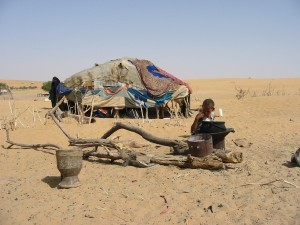
The Sahara Desert is expanding in West Africa, making life extremely difficult for populations around Timbuktu, in northern Mali.
Scientists around the world have made it clear and have done for decades that we’re changing the climate that has allowed us to evolve and flourish. The Intergovernmental Panel on Climate Change (IPCC) issues regular reports full of evidence and warnings about the need for a drastic reduction in greenhouse gas emissions.
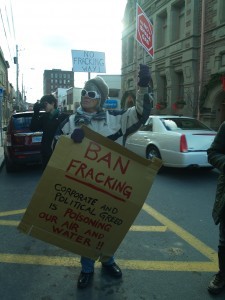
Protesting fracking – a method to extract unconventional oil and gas deposits – in Nova Scotia.
“Our results suggest that, globally, a third of oil reserves, half of gas reserves and over 80 per cent of current coal reserves should remain unused from 2010 to 2050 in order to meet the target of 2 °C,” write Christophe McGlade and Paul Ekins in the prestigious journal, Nature. Their research shows that if we are to limit the global warming to the crucial 2 °C limit, there is no room for any oil and gas development in the Arctic or any increase in unconventional oil production.
Could the warning be clearer? Any starker?
Oh-oh, say I, as I pump fuel into my vehicle and head out on the highway on my way home from the national park. I may drive well below the speed limit to save fuel, but I’m still driving and I’m still burning fossil fuel. I’m part of it. Most of us are. Yes, there are exceptions. There are admirable people — and I know some right in my community in Nova Scotia — who have given up the fossil fuel way of life, taken themselves off the grid and live with electricity they can generate from the sun and wind, reducing their ecological footprints to a tiptoe. And of course there are millions of people in Africa and other less privileged parts of the world who have yet to enjoy any of the luxuries, even the basics, which come with the fossil-fuel-guzzling lifestyles that are causing climate change. But they are not being spared its ravages.

Malte Meinshausen (Greenpeace International)
As a Canadian, I feel like hanging my head in shame at how far my country has risen on the world’s Dishonour Role, five-time winner of the “Colossal Fossil” award for doing the most to disrupt climate change negotiations between 2007 and 2012, laureate of the “Lifetime Unachievement Award” at the 2013 climate talks in Warsaw, and more Fossil of the Day awards at the recent climate talks in Lima. According to the Conference Board of Canada, the country is one of the world’s largest per capita emitters of greenhouse gases; among the 17 members of the OECD, only the US and Australia pump out more greenhouse gas per person than does Canada, earning my country a disgraceful D grade. The energy sector is responsible for 81% of the country’s emissions.
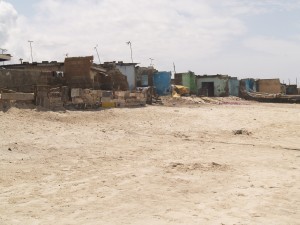
Coastal erosion in Accra, Ghana
West Africa’s coastal areas are already feeling the rising sea levels. This century, some of the poorest people on earth will find their homes, neighbourhoods, cities, farmlands, under ocean water, or find their rivers and farms dried up, thanks to climate change that they are not causing.
So what are the politicians, and other powerful people who preach business as usual and pander to “futures” and profit-making at the expense of the real future, thinking? Well, maybe they’re not. Maybe that’s the whole point. And maybe they’re doing their level best to convince us ordinary people not to think either. Otherwise we might stop buying all that crap.
It pays those who profit from the status quo to keep us from thinking, keep us hooked to (non) reality TV shows, or brainless films that dumb us down to dunce-level, or have us fearing boogie men rather than real and actual threats we are to ourselves. Pogo, Walt Kelly’s possum philosopher, had it right: “We have met the enemy and he is us.” To keep us from noticing this, the corporate- and billionaire-funded think tanks, the entertainment–news conglomerates, and some nefarious politicians and their PR networks put vast amounts of energy and money into keeping us terrified of (or hating) each other, entertained, renovating, building, tanning, buying. And voila! Lulled into a hypnotic state of selfie-snapping inanity, we are able to switch off that annoying part of the human brain that actually thinks about anything that truly matters.
Survival of our species, for example. And the survival of all the other species too that are part of the system that has, till now, allowed our species to evolve and thrive, even if we the human race have not reciprocated the favour. We’ve not been very kind to most wild things. Among them, our closest primate relatives, rare frogs, fish, whales, polar bears, lions, rhinos, sea turtles, corals, orchids. About 36,500 species of plants and animals are now officially listed as threatened. We’ve stolen their habitats, or filled them with garbage and our nasty tailings, hunted or fished them almost into extinction.
“And voila! Lulled into a hypnotic state of selfie-snapping inanity, we are able to switch off that annoying part of the human brain that actually thinks about anything that truly matters.”
If you’ve got a very dark sense of humour, the Anthropocene Age is certainly rich material to work with. We’ve built machines and weapons to kill and maim each other in an incredible number of horrible ways. We’ve used loads of fossil fuels to build appliances, cars, trucks, to save ourselves all those tedious and demanding physical tasks that demand an outlay of human energy — walking, digging, lifting, sweeping, running, paddling, rowing — and then built a whole bunch of other machines (using lots more fossil fuel energy) to mimic these activities to keep us healthy when our overfed sedentary lifestyle starts to make us ill. Is that intelligent, or what?
And then there’s water. What happens to cities of millions of people when there is no more safe water to drink, let alone clean water for washing, flushing toilets, washing clothes? Put it all together, and turmoil, horrific conflict and wars seem inevitable. So does mass suffering and probably death for an awful lot of us on this planet, as precious land and entire nations are flooded, our ocean is filled with garbage and new dead spots, more people struggle for fewer resources. Wars might be fought over fetid streams trickling past empty skyscrapers. What is war, stripped of all its shock and awe, jingoism, religious justifications and military hardware, but fighting over resources and the territory where they are found?
But enough. It is too awful to contemplate. And despair and despondency will get us nowhere.
Dreams and cheerful lunacy trump despair and despondency
And so, I like to dream, ponder the possibilities. Conjure up an Age of Enlightenment. This, I like to imagine, will be the age of truly knowing and wise human beings, Homo sapiens conscientious. Individual wants and needs will be secondary to those not just of the whole community, but of the entire species and all those other species with which they will share the healing planet.
Human activities that emit vast amounts of greenhouse gases will be a thing of the past. The castle in the (polluted) air of the international financial architecture of shell companies, investment banks and wealth managers for the world’s ultra- and also high-net-worth individuals, Forbes List billionaires and tax havens for the super-rich will have long since crumbled along with disaster capitalism, as entire populations demanded genuine democracy and an equitable, sustainable world. Greed will no longer pay.
Utopian? Yes. Simplistic? Yes. But what is optimism but cheerful lunacy? Dreaming is a big part of hoping. And, just maybe, it’s not completely unrealistic. I know there are enough people on this planet with the brains, knowledge, ideas and most of all, the will to bring about the changes we need. We can also look around us to find some of these very traits needed to build an equitable and healthy world. The First Nations peoples of North America respected the land that sustained them, and they constructed great stories and cultural traditions rather than pyramids, coliseums, temples that required slave labour.
I’ve been in many villages in Africa where no one touched a drop of their drink — be it palm wine, water, ginger juice — without pouring a little of it on the ground as a libation, a tribute to their ancestors to whom they felt deeply indebted for the collective knowledge, know-how, wisdom and stories they’d passed down to them. Among some peoples, every new life is viewed as the rebirth of the spirit of an ancestor, and people do not feel disconnected from or dismiss their own past, their predecessors and the earth that sustains them.
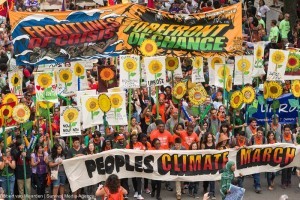
Robert van Waarden (Survival Media Agency), http://350.org/2014-review/
We can all dream. That is a freedom — like freedom of thought and of speech — we must never give up. As Naomi Klein writes in her powerful book, “This Changes Everything”, by joining forces, ordinary people around the world can summon the collective power to challenge the powers that be and the unbridled capitalism they champion that is driving climate change and leading us all to the abyss – the hope lies with us.
(An earlier version of this essay was published in “Nova Scotia: Visions of the Future”, Pottersfield Press, 2009. I decided to post this edited and updated version after reading and being powerfully touched by Naomi Klein’s courageous new book, “This Changes Everything”.)

